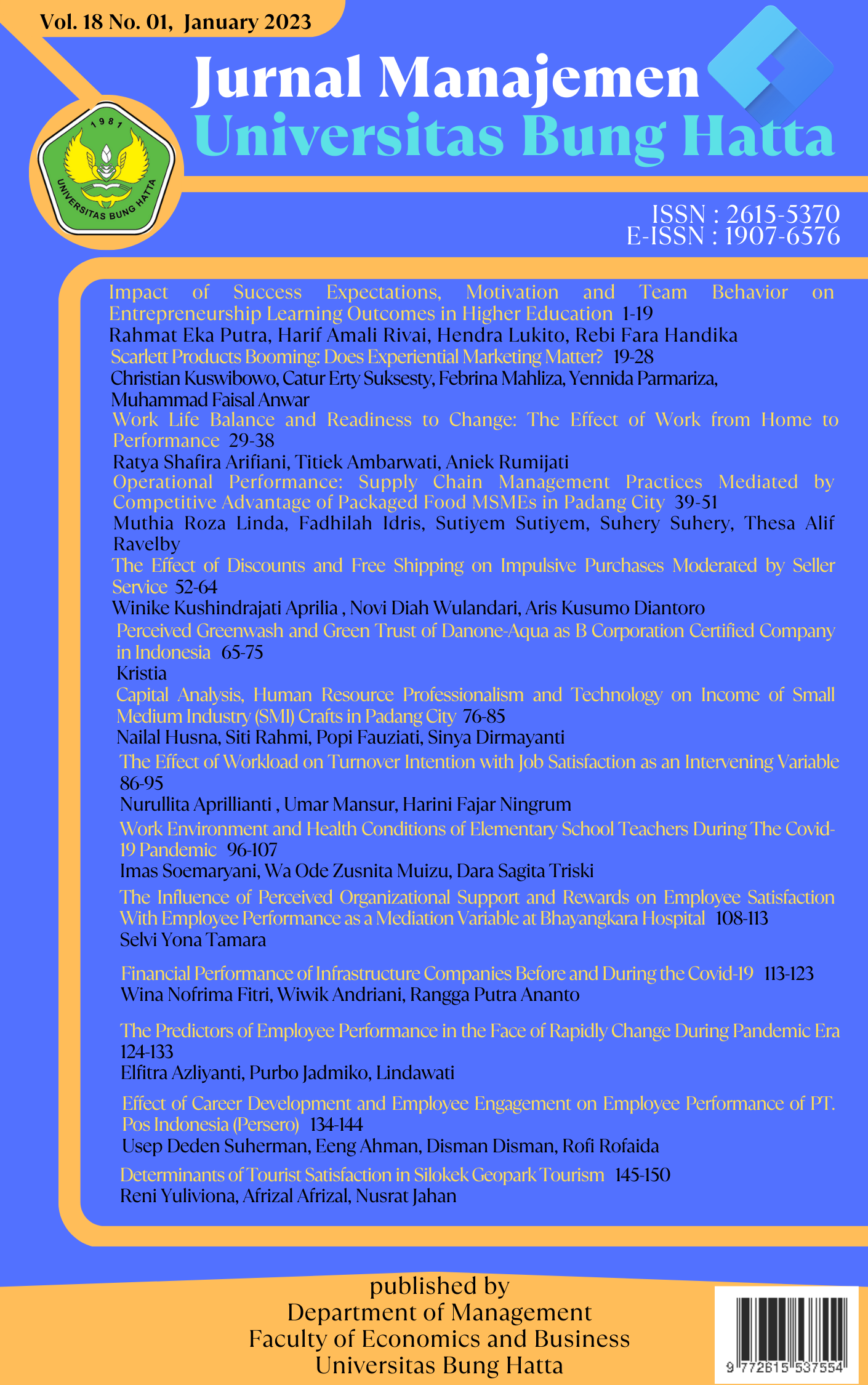Work Life Balance and Readiness to Change: The Effect of Work from Home to Performance
DOI:
https://doi.org/10.37301/jmubh.v18i1.22049Keywords:
performance, readiness to change, work-life balance, work from homeAbstract
The government's policies on the COVID-19 pandemic have begun to loosen, notably in the education sector.This policy, however, will alter when Covid-19 cases emerge, particularly in Malang City. Covid-19 cases have decreased and a face-to-face learning strategy has been introduced, but this has altered because Covid-19 cases have risen again and have penetrated school clusters, thus some schools have begun with online learning. This study examines the effect of working from home on performance as a result of a new working environment and several policy changes to determine whether it has an impact and an effect on performance. The study then investigates the impact of working from home on change readiness, where changes in work patterns force workers to adapt to technology and become entirely online. Furthermore, given the work imbalance, work-life balance is being researched as a mediating variable by concentrating on activities outside of work that will have an impact on performance. This is an explanatory study that takes a quantitative approach. The results of the data were obtained by distributing questionnaires as primary data, and the respondents of this study were teachers in Malang city. The path analysis tool employed SmartPLS 3.0 software. The findings revealed that work from home has no effect on performance, work from home has no effect on work-life balance, work-life balance has no effect on performance, work from home has an effect on readiness to change, and readiness to change affects performance. Work-life balance does not moderate the effect of working from home on performance, but Readiness to Change does.
References
Armenakis, A. A., Harris, S. G., & Mossholder, K. W. (1993). Armenakis, Harris & Mossholder (1993) Creating Readiness for Organizational Change. Human Relations, Vol. 46, pp. 681–703.
Ashal, R. A. (2020). Pengaruh Work From Home terhadap Kinerja Aparatur Sipil Negara di Kantor Imigrasi Kelas I Khusus TPI Medan. Jurnal Ilmiah Kebijakan Hukum, 14(2), 223. https://doi.org/10.30641/kebijakan.2020.v14.223-242
Bernerth, J. (2004). Expanding Our Understanding of the Change Message. Human Resource Development Review, 3(1), 36–52. https://doi.org/10.1177/1534484303261230
Dessler, G. (2015). Manajemen Sumber Daya Manusia (terjemahan). Jakarta: Salemba Empat.
Dipuria, P., & Kakar, D. (2013). Work-life balance for working parents: perspectives and strategies. Journal of Strategic Human Resource Management, 2(1), 45–52.
Fisher, G. G., Bulger, C. A., & Smith, C. S. (2009). Beyond Work and Family: A Measure of Work/Nonwork Interference and Enhancement. Journal of Occupational Health Psychology, 14(4), 441–456. https://doi.org/10.1037/a0016737
Grimm, G. H. (2017). From Engagement to Commitment: A New Perspective On the Employee Attitude-Firm Performance Relationship. International Leadership Journal, 9, 3–29.
Holt, D. T., Armenakis, A. A., Feild, H. S., & Harris, S. G. (2007). Readiness for organizational change: The systematic development of a scale. Journal of Applied Behavioral Science, 43(2), 232–255. https://doi.org/10.1177/0021886306295295
Irawanto, D. W., Novianti, K. R., & Roz, K. (2021). Work from home: Measuring satisfaction between work–life balance and work stress during the covid-19 pandemic in indonesia. Economies, 9(3). https://doi.org/10.3390/economies9030096
Kim, H. K. (2014). Work-Life Balance and Employees’ Performance: The Mediating Role of Affective Commitment. An International Journal, 6(1), 37–51.
Liang, J., Roberts, J., Ying, Z. J., Cao, J., Qi, M., & Sun, M. (2018). Does Working From Home Work ? Evidence From A Chinese Experiment. The Quarterly Journal of Economics, 130(1), 165–218. https://doi.org/10.1093/qje/qju032.Advance
Malchiel Ravanelli, D., Purnama Ersani Putri, R., Karyna Putri, Z., & Miftahul Jannah, L. (2020). Teacher’s Readiness Level in Implementing Work from Home Policy in Indonesia. Iapa Proceedings Conference, 637.https://doi.org/10.30589/proceedings.2020.431
Mangkunegara, A. P. (2013). Manajemen Sumberdaya Manusia Perusahaan. Bandung: PT. Remaja.
Nasution, I., & Rosanti, R. (2020). Pengaruh Bekerja Dari Rumah (Work From Home) Terhadap Kinerja Karyawan Bpkp. Jurnal Ilmiah Akuntansi Budgeting, 1(1), 9–14.
Novitasari, D., & Asbari, M. (2020). Work-Family Conflict , Readiness for Change and Employee Performance Relationship During the Covid-19 Pandemic. 6(2), 67–77.
Onyemaechi, U., Chinyere, U. P., & Emmanuel, U. (2018). Impact of Telecommuting on Employees’ Performance. Journal of Economics and Management Sciences, (December), p54. https://doi.org/10.30560/jems.v1n3p54
Sugiyono. (2013). Metode Penelitian Kuantitatif, Kualitatif, dan R&D. Bandung: Alfabeta.
Susilo, D. (2020). Revealing the Effect of Work-From-Home on Job Performance during the Covid-19 Crisis: Empirical Evidence from Indonesia. Journal of Contemporary Issues in Business and Government, 26(01). https://doi.org/10.47750/cibg.2020.26.01.002
Tri, S. R. C. (2020). Pengaruh Work From Home (WFH) Terhadap Kinerja Guru SD Negeri Dengkek 01 Pati Selama Masa Pandemi Covid-19. EduPsyCouns: Journal of Education, Psychology and Counseling, 2(1), 424–437. Retrieved from https://ummaspul.e-journal.id/Edupsycouns/article/view/500
Downloads
Published
Issue
Section
License
Copyright (c) 2023 Ratya Shafira Arifiani, Titiek Ambarwati, Aniek Rumijati

This work is licensed under a Creative Commons Attribution-ShareAlike 4.0 International License.
Authors who publish with Jurnal Manajemen Universitas Bung Hatta agree to the following terms:
- Authors retain copyright and grant the journal right of first publication with the work simultaneously licensed under a Creative Creative Commons Attribution-ShareAlike 4.0 International License that allows others to share the work with an acknowledgement of the work's authorship and initial publication in Jurnal Manajemen Universitas Bung Hatta.
- The author holds the copyright of the submitted and published articles, with the understanding that articles are disseminated under the Creative Commons Attribution-ShareAlike 4.0 International License..
- The editor team is entitled to do the editing in accordance with the guidelines for writing or template in the Jurnal Manajemen Universitas Bung Hatta.
This work is licensed under a Creative Commons Attribution-ShareAlike 4.0 International License.












